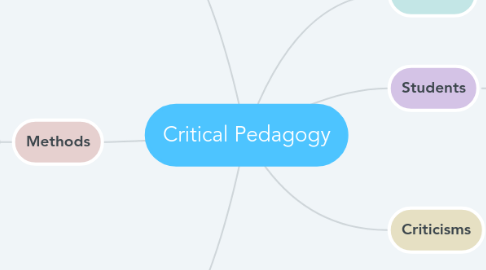Critical Pedagogy
par Lesley Emerson


1. Schools
1.1. implications for how we assess, what we teach, adult-child relationships
1.2. implications for classroom layout even!
1.3. implications for hierachial structures in schools
2. Methods
2.1. provide multiple perspectives
2.2. ensure these perspectives speak to the 'political' and challenge assumptions
2.3. seek to 'disrupt' thinking and assumptions
2.4. stands in oppostion to traditional methods
2.4.1. opposed to 'banking education' where students are just 'filled up' with knowledge from teacher
2.5. conscientization
2.5.1. aimed at developing critical consciousness
2.5.2. awareness of injustices
2.6. focused on empowerment and action
2.7. use of dialogue
2.8. social and collaborative
3. Content
3.1. varied, authentic, inclusive
3.2. values working class (and indigenous) knowledges
3.3. significant and relevant to students
4. Teachers
4.1. challenges teacher-student dichotomy
4.1.1. teachers can learn from students
4.2. aware of identities of students and of themselves
4.2.1. though see criticisms that intersectionality is not always addressed
5. Students
5.1. co-producers of knowledge
5.2. identities acknowledged
5.2.1. though again critique that this is often overly focused on class
6. Criticisms
6.1. overly focused on class
6.2. essentializes individuals
6.3. obviously criticisms from the 'right' that it has an overt political agenda
6.4. is it possible in current educational systems?
6.4.1. some schools in Brazil are based on critical pedagogy approaches (see Landless People's movement)
